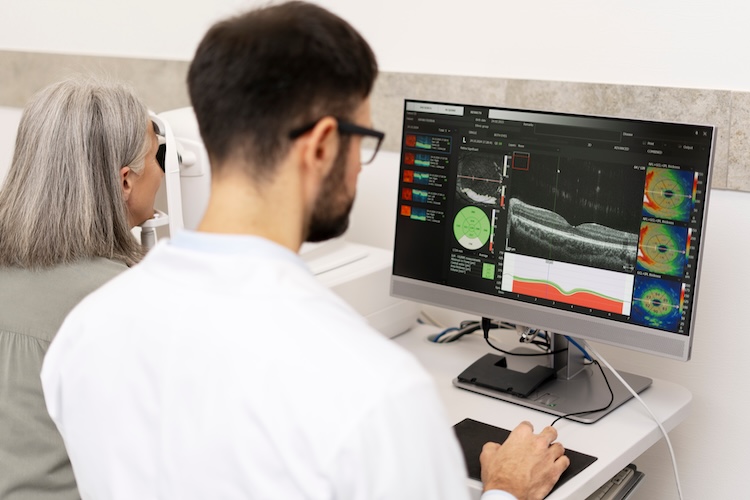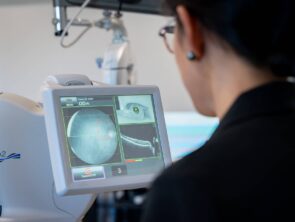Can Your Astigmatism Get Worse Over Time? Here’s What You Need to Know
If you are one of the over 1 million Australians with astigmatism, you’ve likely wondered, “Can astigmatism get worse over time?”. While astigmatism can worsen over time, there are many effective ways to monitor and manage it.
So what causes astigmatism to worsen? Factors include natural ageing changes, lifestyle factors, and eye trauma.
In this guide, I’ll cover how astigmatism can change over time, symptoms to watch for, and the effective treatments that may help.
What Is Astigmatism?
Astigmatism is the imperfect curvature of the cornea or lens. Clear vision involves a round eye, while astigmatism involves more of an oval shape.
This irregular curvature affects how light rays enter the eye. The shape causes light rays to bend improperly so they cannot focus on the retina. This results in blurred vision.
Astigmatism is a refractive error, like farsightedness and nearsightedness. While farsightedness and nearsightedness cause blurry vision at certain distances, astigmatism affects overall vision.
Symptoms of Astigmatism
Symptoms of astigmatism may include:
- Difficulty seeing letters from a distance
- Distorted vision
- Blurry vision
- Eye strain or fatigue
- Headaches
- Halos in your vision
- Squinting
- Difficulty driving at night
If you notice symptoms of astigmatism, schedule an appointment with your optometrist right away. There are a variety of effective ways to manage astigmatism.
Can Astigmatism Get Worse Over Time?
Yes, astigmatism can worsen over time. This can result from several factors, such as changes to the shape of the eye and natural ageing. External and lifestyle factors may also contribute to worsening vision.
Next, we’ll look closer at the answers to, “What causes astigmatism to get worse?”.
What Causes Astigmatism to Worsen?
Natural Ageing
As you age, your eyes undergo natural changes. The shape of the cornea can change with age, especially in individuals with astigmatism. Changes in eye muscles, eyelid tension, and other natural aspects of ageing can potentially worsen astigmatism.
Eye Injuries or Surgery
Trauma or certain surgeries can alter corneal shape, causing astigmatism to worsen. Eye injuries, such as chemical exposure or blunt force, can also change the shape of the cornea or lens.
For instance, if the cornea is scratched and heals irregularly, it can cause uneven light refraction.
If you experience trauma to the eye, make sure to schedule an appointment with your optometrist right away. Your optometrist can evaluate any injuries to the eye and monitor healing to ensure the best possible outcome.
Eye Conditions Like Keratoconus
Keratoconus is a vision condition that affects the cornea’s shape. It causes the cornea to thin and bulge, which can distort light rays and worsen astigmatism. Keratoconus is not common, but regular eye checkups are important to rule out conditions like this.
Uncorrected Vision Problems
Uncorrected vision problems can also worsen astigmatism. For instance, if you strain your eyes frequently due to an uncorrected vision issue, it can increase astigmatism symptoms.
Poor Eye Habits
Certain lifestyle habits can also worsen astigmatism. To help protect your vision, avoid these poor eye habits:
- Excessive screen time
- Reading or performing activities in poor lighting
- Excessive fatigue, which may exacerbate symptoms of astigmatism
- Chronic eye rubbing
- Prolonged activities that aggravate the eyes
- Wearing the wrong prescription contact lenses or glasses
Can Astigmatism Be Corrected?
When my patients ask, “Can astigmatism be corrected?”, I love sharing the various, effective treatment options.
There are several effective treatments for astigmatism, including:
- Glasses and contact lenses (toric lenses): Glasses and contact lenses are a common astigmatism treatment, especially for mild to moderate cases.
- Orthokeratology (Ortho-K lenses for night-time correction)
- Laser eye surgery (more on this next)
Can Laser Eye Surgery Fix Astigmatism?
Yes, LASIK and other refractive surgeries can correct certain types of astigmatism and eliminate the need to wear corrective eyewear. However, not everyone is a suitable candidate.
If you’re wondering, “Can laser eye surgery fix astigmatism?” and curious if it’s a good fit for you, you’ll need an evaluation. Laser eye surgery requires a thorough assessment to ensure you are an ideal candidate.
Adults with mostly stable vision may be suitable for laser eye surgery. E Eye Place can assess your vision and determine if you are a good candidate for laser eye surgery.
When to See an Optometrist
If you are concerned that your astigmatism may be worsening, it is time to see an optometrist. It is important for an eye care professional to carefully monitor your astigmatism and vision health.
Signs your astigmatism may be worsening:
- More frequent headaches
- Blurry vision
- Eye strain
- Worsening vision, such as increased distortion
- Difficulty seeing at night
- Lack of vision correction from your current glasses or contact lenses prescription
- Increased light sensitivity
- Eye injury
If you notice these possible signs of worsening astigmatism, consult with your optometrist right away.
Regular visits with your optometrist are crucial for protecting your vision and monitoring astigmatism. Regular eye tests can detect changes to your vision and ensure prompt treatment. E Eye Place supports long-term eye health with our tailored treatment plans, in-depth eye tests, and genuine care for our patients.
Book an Eye Test with E Eye Place
Astigmatism is a common vision condition that can cause eye strain, headaches, and blurry vision. Fortunately, astigmatism is manageable with a variety of treatment options.
“Can astigmatism get worse?”
Yes, it can. Fortunately, astigmatism can be monitored with regular eye appointments and effectively treated. Check out our state of the art technology we use for eye tests!
Since astigmatism can worsen over time, regular eye appointments are vital for monitoring your vision health. Our team at E Eye Place provides comprehensive eye exams and regular vision assessments to accurately monitor changes to your eye health.
Contact us today to schedule your appointment for an eye exam, and we’ll move toward a clearer future together.





